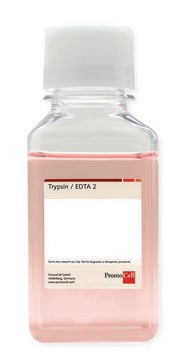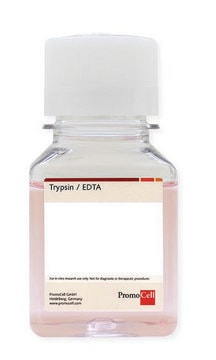C-41000
Trypsin / EDTA
0.04% Trypsin / 0.03% EDTA, 30 ml
Sign Into View Organizational & Contract Pricing
All Photos(1)
About This Item
UNSPSC Code:
12352207
NACRES:
NA.78
Recommended Products
form
aqueous solution
packaging
pkg of 30 ml
technique(s)
cell culture | mammalian: suitable
shipped in
dry ice
storage temp.
−20°C
General description
Trypsin / EDTA (0.04% / 0.03%)
Application
Trypsin is still the most widely employed enzyme used for cell detachment. PromoCell´s Trypsin Solutions exhibit standardized enzyme activity and contain trypsin from extra-pure lots. This Trypsin/EDTA Solution has a ratio of 0.04% trypsin and 0.03% EDTA and is available in different sizes.
Quality
All lots of PromoCell Cell Detachment Reagents are subjected to comprehensive quality control tests. Each lot is routinely tested for biological function, absence of cytotoxicity, and physical parameters such as osmolality and pH level. Approved in-house lots are used as a reference. In addition, all lots have been tested for the absence of microbial contaminants (fungi, bacteria).
Storage and Stability
Store at -20°C in the dark immediately after arrival. Refrigerate thawed solution at 4 to 8°C. If stored properly, the product is stable until the expiry date stated on the label.
Subculture Routine
Click here for more information.
Storage Class Code
12 - Non Combustible Liquids
WGK
WGK 1
Certificates of Analysis (COA)
Search for Certificates of Analysis (COA) by entering the products Lot/Batch Number. Lot and Batch Numbers can be found on a product’s label following the words ‘Lot’ or ‘Batch’.
Already Own This Product?
Find documentation for the products that you have recently purchased in the Document Library.
Customers Also Viewed
Uma S Kamaraj et al.
Cell systems, 11(5), 509-522 (2020-10-11)
The need to derive and culture diverse cell or tissue types in vitro has prompted investigations on how changes in culture conditions affect cell states. However, the identification of the optimal conditions (e.g., signaling molecules and growth factors) required to maintain
Our team of scientists has experience in all areas of research including Life Science, Material Science, Chemical Synthesis, Chromatography, Analytical and many others.
Contact Technical Service






